Reflective Practice Report: Healthcare Professional Skills
VerifiedAdded on 2023/01/19
|8
|3086
|34
Report
AI Summary
This report delves into the application of reflective practice within a healthcare setting, focusing on the author's experiences and observations during a group presentation. The report highlights the importance of learning from past experiences, utilizing the Kolb learning cycle to analyze personal growth and development. It examines challenges such as conflict of interest, lack of trust, and engagement within a multidisciplinary team, and proposes solutions through improved task delegation, communication, and team meetings. The author identifies specific areas for improvement, formulating smart goals to enhance presentation skills, team management, and overall professional competence. The report emphasizes the significance of teamwork, the impact of individual contributions, and the ongoing process of learning and adapting in the healthcare field. It also describes how the Care Act 2014 is used to highlight the importance of reflective practices and learning from experiences.
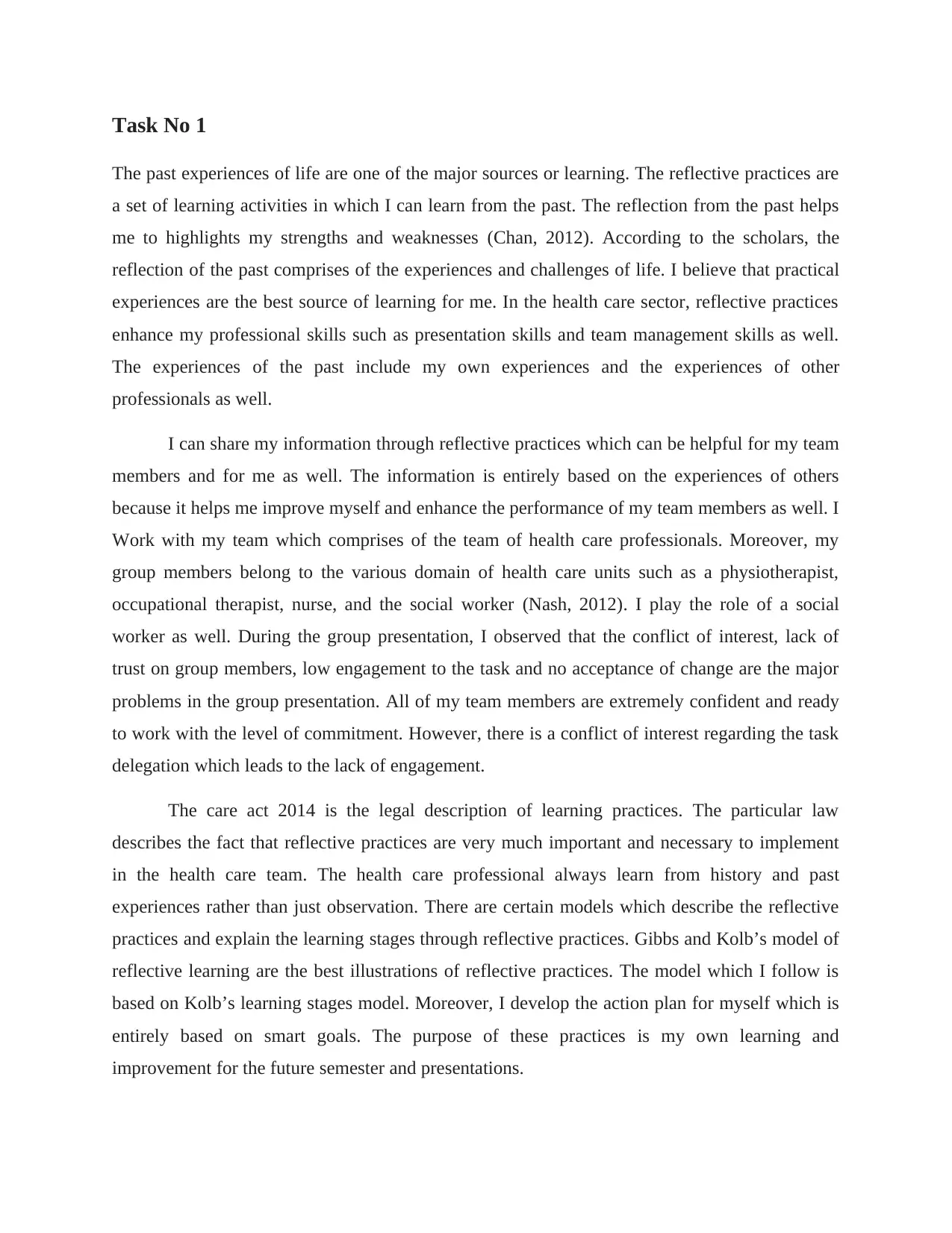
Task No 1
The past experiences of life are one of the major sources or learning. The reflective practices are
a set of learning activities in which I can learn from the past. The reflection from the past helps
me to highlights my strengths and weaknesses (Chan, 2012). According to the scholars, the
reflection of the past comprises of the experiences and challenges of life. I believe that practical
experiences are the best source of learning for me. In the health care sector, reflective practices
enhance my professional skills such as presentation skills and team management skills as well.
The experiences of the past include my own experiences and the experiences of other
professionals as well.
I can share my information through reflective practices which can be helpful for my team
members and for me as well. The information is entirely based on the experiences of others
because it helps me improve myself and enhance the performance of my team members as well. I
Work with my team which comprises of the team of health care professionals. Moreover, my
group members belong to the various domain of health care units such as a physiotherapist,
occupational therapist, nurse, and the social worker (Nash, 2012). I play the role of a social
worker as well. During the group presentation, I observed that the conflict of interest, lack of
trust on group members, low engagement to the task and no acceptance of change are the major
problems in the group presentation. All of my team members are extremely confident and ready
to work with the level of commitment. However, there is a conflict of interest regarding the task
delegation which leads to the lack of engagement.
The care act 2014 is the legal description of learning practices. The particular law
describes the fact that reflective practices are very much important and necessary to implement
in the health care team. The health care professional always learn from history and past
experiences rather than just observation. There are certain models which describe the reflective
practices and explain the learning stages through reflective practices. Gibbs and Kolb’s model of
reflective learning are the best illustrations of reflective practices. The model which I follow is
based on Kolb’s learning stages model. Moreover, I develop the action plan for myself which is
entirely based on smart goals. The purpose of these practices is my own learning and
improvement for the future semester and presentations.
The past experiences of life are one of the major sources or learning. The reflective practices are
a set of learning activities in which I can learn from the past. The reflection from the past helps
me to highlights my strengths and weaknesses (Chan, 2012). According to the scholars, the
reflection of the past comprises of the experiences and challenges of life. I believe that practical
experiences are the best source of learning for me. In the health care sector, reflective practices
enhance my professional skills such as presentation skills and team management skills as well.
The experiences of the past include my own experiences and the experiences of other
professionals as well.
I can share my information through reflective practices which can be helpful for my team
members and for me as well. The information is entirely based on the experiences of others
because it helps me improve myself and enhance the performance of my team members as well. I
Work with my team which comprises of the team of health care professionals. Moreover, my
group members belong to the various domain of health care units such as a physiotherapist,
occupational therapist, nurse, and the social worker (Nash, 2012). I play the role of a social
worker as well. During the group presentation, I observed that the conflict of interest, lack of
trust on group members, low engagement to the task and no acceptance of change are the major
problems in the group presentation. All of my team members are extremely confident and ready
to work with the level of commitment. However, there is a conflict of interest regarding the task
delegation which leads to the lack of engagement.
The care act 2014 is the legal description of learning practices. The particular law
describes the fact that reflective practices are very much important and necessary to implement
in the health care team. The health care professional always learn from history and past
experiences rather than just observation. There are certain models which describe the reflective
practices and explain the learning stages through reflective practices. Gibbs and Kolb’s model of
reflective learning are the best illustrations of reflective practices. The model which I follow is
based on Kolb’s learning stages model. Moreover, I develop the action plan for myself which is
entirely based on smart goals. The purpose of these practices is my own learning and
improvement for the future semester and presentations.
Paraphrase This Document
Need a fresh take? Get an instant paraphrase of this document with our AI Paraphraser
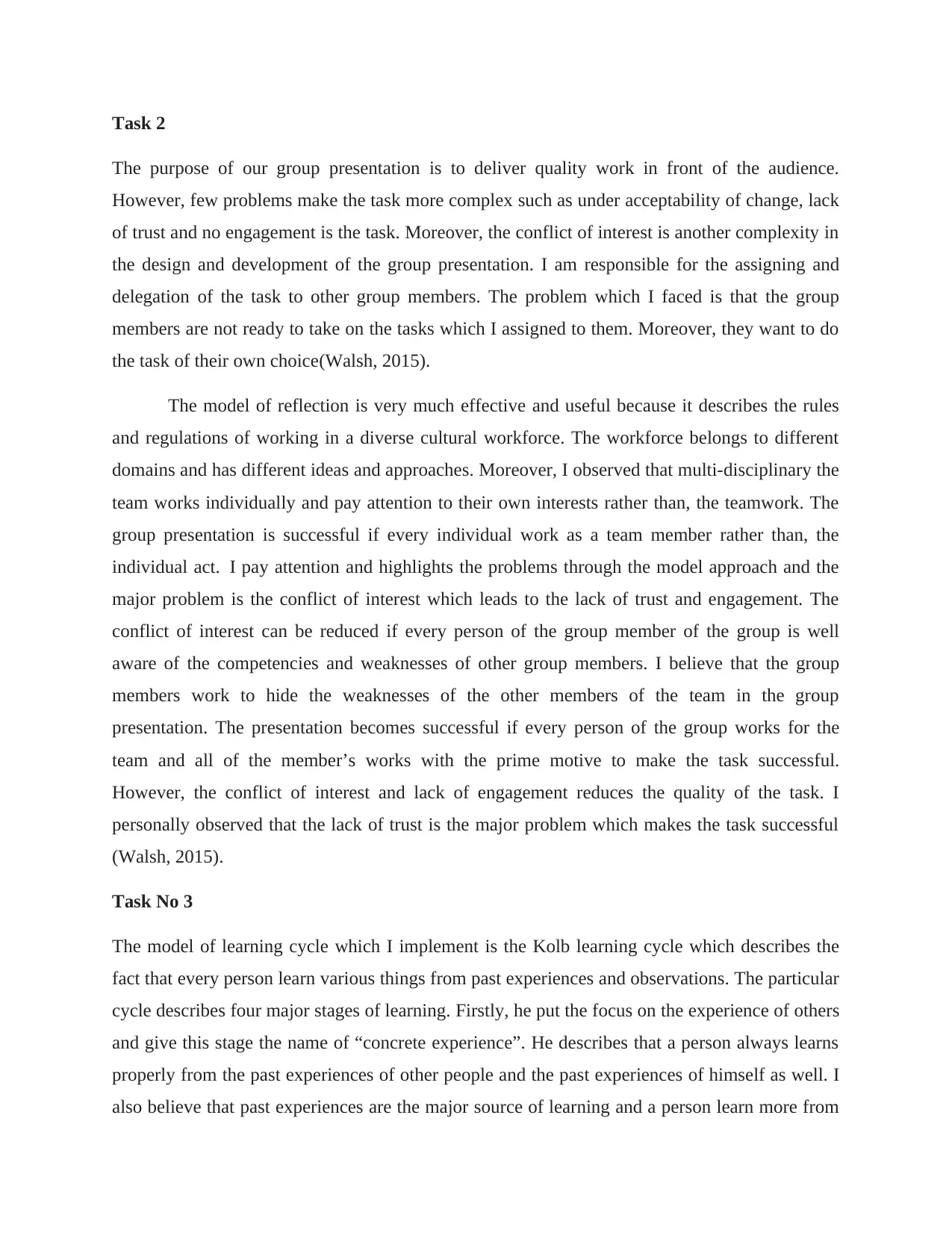
Task 2
The purpose of our group presentation is to deliver quality work in front of the audience.
However, few problems make the task more complex such as under acceptability of change, lack
of trust and no engagement is the task. Moreover, the conflict of interest is another complexity in
the design and development of the group presentation. I am responsible for the assigning and
delegation of the task to other group members. The problem which I faced is that the group
members are not ready to take on the tasks which I assigned to them. Moreover, they want to do
the task of their own choice(Walsh, 2015).
The model of reflection is very much effective and useful because it describes the rules
and regulations of working in a diverse cultural workforce. The workforce belongs to different
domains and has different ideas and approaches. Moreover, I observed that multi-disciplinary the
team works individually and pay attention to their own interests rather than, the teamwork. The
group presentation is successful if every individual work as a team member rather than, the
individual act. I pay attention and highlights the problems through the model approach and the
major problem is the conflict of interest which leads to the lack of trust and engagement. The
conflict of interest can be reduced if every person of the group member of the group is well
aware of the competencies and weaknesses of other group members. I believe that the group
members work to hide the weaknesses of the other members of the team in the group
presentation. The presentation becomes successful if every person of the group works for the
team and all of the member’s works with the prime motive to make the task successful.
However, the conflict of interest and lack of engagement reduces the quality of the task. I
personally observed that the lack of trust is the major problem which makes the task successful
(Walsh, 2015).
Task No 3
The model of learning cycle which I implement is the Kolb learning cycle which describes the
fact that every person learn various things from past experiences and observations. The particular
cycle describes four major stages of learning. Firstly, he put the focus on the experience of others
and give this stage the name of “concrete experience”. He describes that a person always learns
properly from the past experiences of other people and the past experiences of himself as well. I
also believe that past experiences are the major source of learning and a person learn more from
The purpose of our group presentation is to deliver quality work in front of the audience.
However, few problems make the task more complex such as under acceptability of change, lack
of trust and no engagement is the task. Moreover, the conflict of interest is another complexity in
the design and development of the group presentation. I am responsible for the assigning and
delegation of the task to other group members. The problem which I faced is that the group
members are not ready to take on the tasks which I assigned to them. Moreover, they want to do
the task of their own choice(Walsh, 2015).
The model of reflection is very much effective and useful because it describes the rules
and regulations of working in a diverse cultural workforce. The workforce belongs to different
domains and has different ideas and approaches. Moreover, I observed that multi-disciplinary the
team works individually and pay attention to their own interests rather than, the teamwork. The
group presentation is successful if every individual work as a team member rather than, the
individual act. I pay attention and highlights the problems through the model approach and the
major problem is the conflict of interest which leads to the lack of trust and engagement. The
conflict of interest can be reduced if every person of the group member of the group is well
aware of the competencies and weaknesses of other group members. I believe that the group
members work to hide the weaknesses of the other members of the team in the group
presentation. The presentation becomes successful if every person of the group works for the
team and all of the member’s works with the prime motive to make the task successful.
However, the conflict of interest and lack of engagement reduces the quality of the task. I
personally observed that the lack of trust is the major problem which makes the task successful
(Walsh, 2015).
Task No 3
The model of learning cycle which I implement is the Kolb learning cycle which describes the
fact that every person learn various things from past experiences and observations. The particular
cycle describes four major stages of learning. Firstly, he put the focus on the experience of others
and give this stage the name of “concrete experience”. He describes that a person always learns
properly from the past experiences of other people and the past experiences of himself as well. I
also believe that past experiences are the major source of learning and a person learn more from
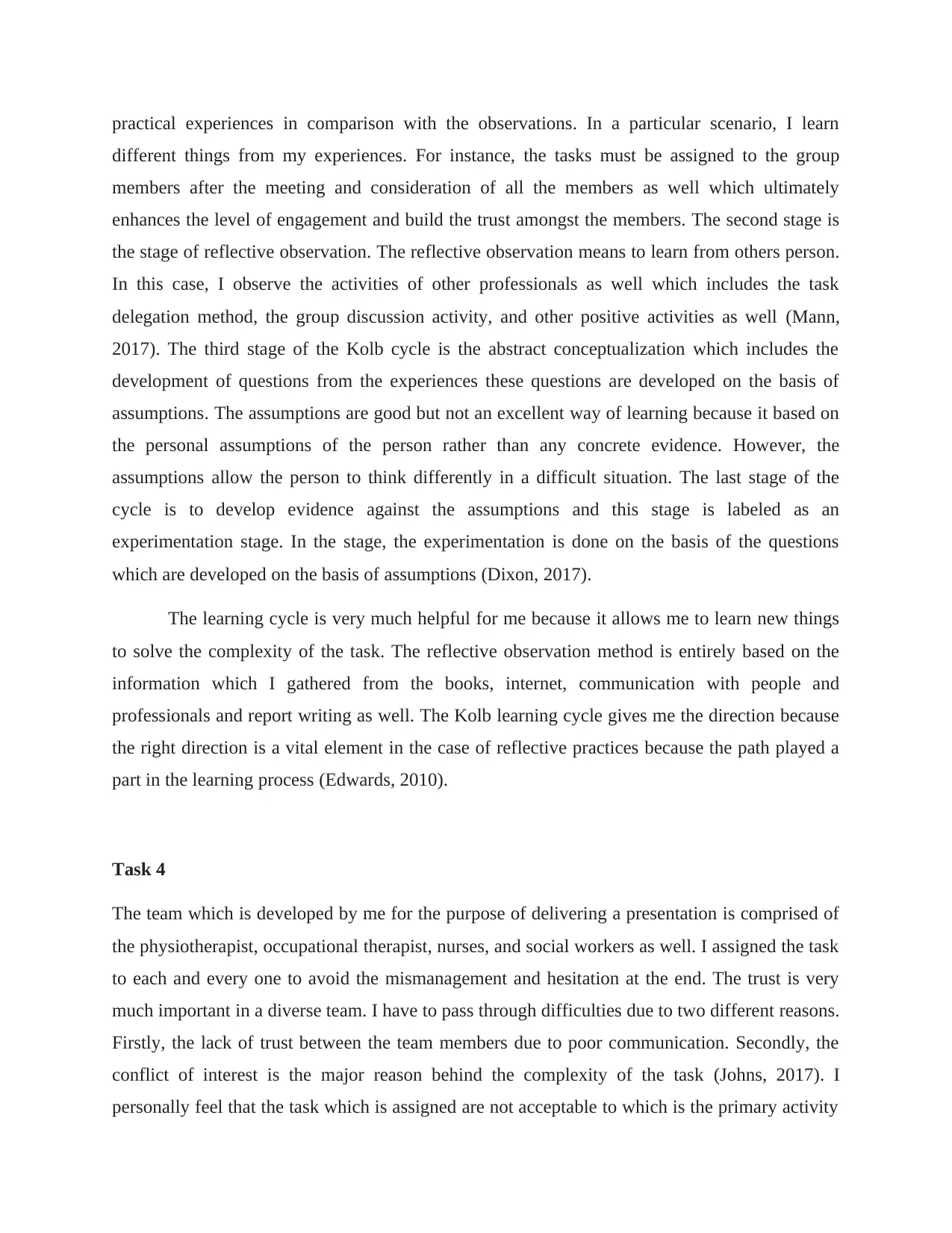
practical experiences in comparison with the observations. In a particular scenario, I learn
different things from my experiences. For instance, the tasks must be assigned to the group
members after the meeting and consideration of all the members as well which ultimately
enhances the level of engagement and build the trust amongst the members. The second stage is
the stage of reflective observation. The reflective observation means to learn from others person.
In this case, I observe the activities of other professionals as well which includes the task
delegation method, the group discussion activity, and other positive activities as well (Mann,
2017). The third stage of the Kolb cycle is the abstract conceptualization which includes the
development of questions from the experiences these questions are developed on the basis of
assumptions. The assumptions are good but not an excellent way of learning because it based on
the personal assumptions of the person rather than any concrete evidence. However, the
assumptions allow the person to think differently in a difficult situation. The last stage of the
cycle is to develop evidence against the assumptions and this stage is labeled as an
experimentation stage. In the stage, the experimentation is done on the basis of the questions
which are developed on the basis of assumptions (Dixon, 2017).
The learning cycle is very much helpful for me because it allows me to learn new things
to solve the complexity of the task. The reflective observation method is entirely based on the
information which I gathered from the books, internet, communication with people and
professionals and report writing as well. The Kolb learning cycle gives me the direction because
the right direction is a vital element in the case of reflective practices because the path played a
part in the learning process (Edwards, 2010).
Task 4
The team which is developed by me for the purpose of delivering a presentation is comprised of
the physiotherapist, occupational therapist, nurses, and social workers as well. I assigned the task
to each and every one to avoid the mismanagement and hesitation at the end. The trust is very
much important in a diverse team. I have to pass through difficulties due to two different reasons.
Firstly, the lack of trust between the team members due to poor communication. Secondly, the
conflict of interest is the major reason behind the complexity of the task (Johns, 2017). I
personally feel that the task which is assigned are not acceptable to which is the primary activity
different things from my experiences. For instance, the tasks must be assigned to the group
members after the meeting and consideration of all the members as well which ultimately
enhances the level of engagement and build the trust amongst the members. The second stage is
the stage of reflective observation. The reflective observation means to learn from others person.
In this case, I observe the activities of other professionals as well which includes the task
delegation method, the group discussion activity, and other positive activities as well (Mann,
2017). The third stage of the Kolb cycle is the abstract conceptualization which includes the
development of questions from the experiences these questions are developed on the basis of
assumptions. The assumptions are good but not an excellent way of learning because it based on
the personal assumptions of the person rather than any concrete evidence. However, the
assumptions allow the person to think differently in a difficult situation. The last stage of the
cycle is to develop evidence against the assumptions and this stage is labeled as an
experimentation stage. In the stage, the experimentation is done on the basis of the questions
which are developed on the basis of assumptions (Dixon, 2017).
The learning cycle is very much helpful for me because it allows me to learn new things
to solve the complexity of the task. The reflective observation method is entirely based on the
information which I gathered from the books, internet, communication with people and
professionals and report writing as well. The Kolb learning cycle gives me the direction because
the right direction is a vital element in the case of reflective practices because the path played a
part in the learning process (Edwards, 2010).
Task 4
The team which is developed by me for the purpose of delivering a presentation is comprised of
the physiotherapist, occupational therapist, nurses, and social workers as well. I assigned the task
to each and every one to avoid the mismanagement and hesitation at the end. The trust is very
much important in a diverse team. I have to pass through difficulties due to two different reasons.
Firstly, the lack of trust between the team members due to poor communication. Secondly, the
conflict of interest is the major reason behind the complexity of the task (Johns, 2017). I
personally feel that the task which is assigned are not acceptable to which is the primary activity
⊘ This is a preview!⊘
Do you want full access?
Subscribe today to unlock all pages.

Trusted by 1+ million students worldwide
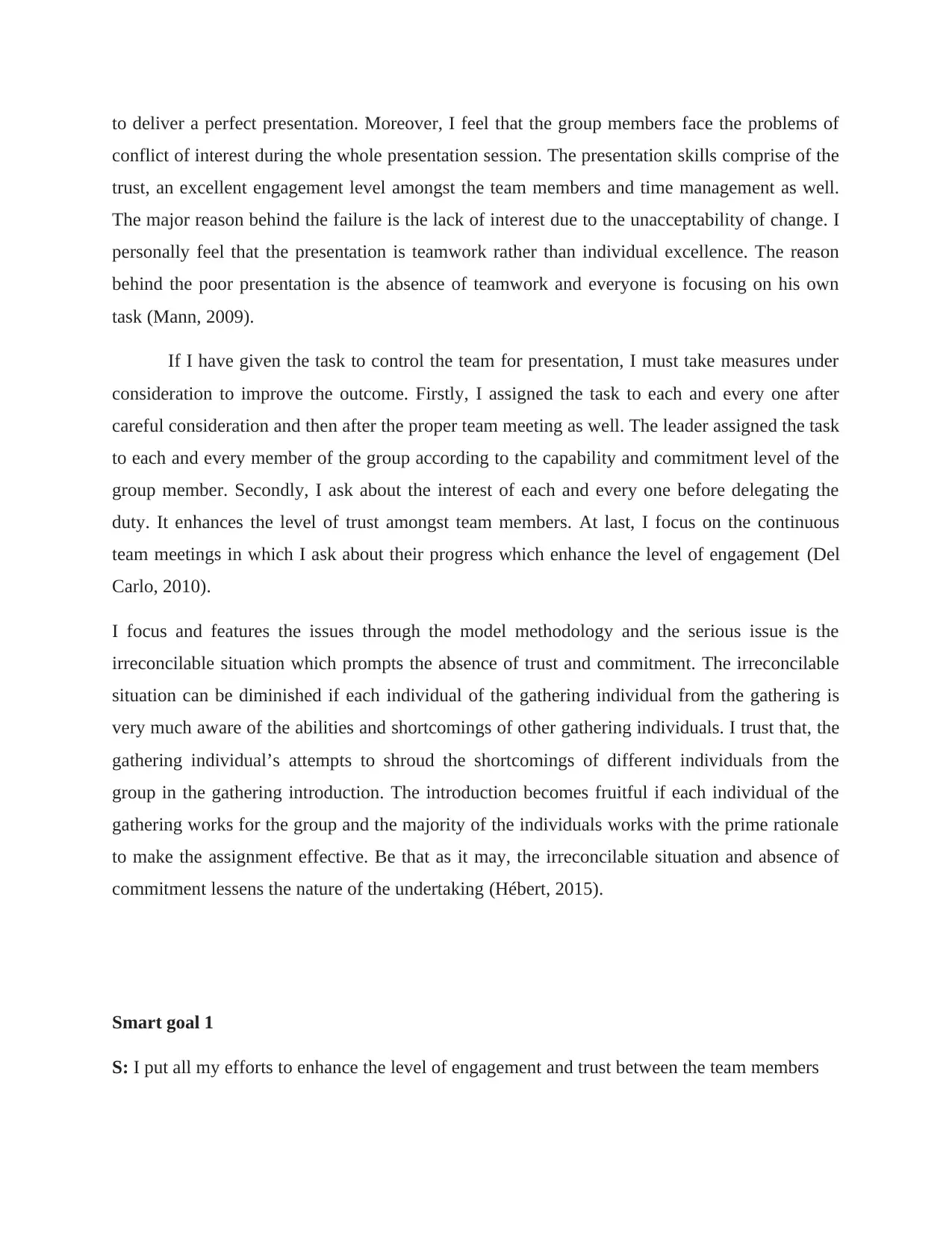
to deliver a perfect presentation. Moreover, I feel that the group members face the problems of
conflict of interest during the whole presentation session. The presentation skills comprise of the
trust, an excellent engagement level amongst the team members and time management as well.
The major reason behind the failure is the lack of interest due to the unacceptability of change. I
personally feel that the presentation is teamwork rather than individual excellence. The reason
behind the poor presentation is the absence of teamwork and everyone is focusing on his own
task (Mann, 2009).
If I have given the task to control the team for presentation, I must take measures under
consideration to improve the outcome. Firstly, I assigned the task to each and every one after
careful consideration and then after the proper team meeting as well. The leader assigned the task
to each and every member of the group according to the capability and commitment level of the
group member. Secondly, I ask about the interest of each and every one before delegating the
duty. It enhances the level of trust amongst team members. At last, I focus on the continuous
team meetings in which I ask about their progress which enhance the level of engagement (Del
Carlo, 2010).
I focus and features the issues through the model methodology and the serious issue is the
irreconcilable situation which prompts the absence of trust and commitment. The irreconcilable
situation can be diminished if each individual of the gathering individual from the gathering is
very much aware of the abilities and shortcomings of other gathering individuals. I trust that, the
gathering individual’s attempts to shroud the shortcomings of different individuals from the
group in the gathering introduction. The introduction becomes fruitful if each individual of the
gathering works for the group and the majority of the individuals works with the prime rationale
to make the assignment effective. Be that as it may, the irreconcilable situation and absence of
commitment lessens the nature of the undertaking (Hébert, 2015).
Smart goal 1
S: I put all my efforts to enhance the level of engagement and trust between the team members
conflict of interest during the whole presentation session. The presentation skills comprise of the
trust, an excellent engagement level amongst the team members and time management as well.
The major reason behind the failure is the lack of interest due to the unacceptability of change. I
personally feel that the presentation is teamwork rather than individual excellence. The reason
behind the poor presentation is the absence of teamwork and everyone is focusing on his own
task (Mann, 2009).
If I have given the task to control the team for presentation, I must take measures under
consideration to improve the outcome. Firstly, I assigned the task to each and every one after
careful consideration and then after the proper team meeting as well. The leader assigned the task
to each and every member of the group according to the capability and commitment level of the
group member. Secondly, I ask about the interest of each and every one before delegating the
duty. It enhances the level of trust amongst team members. At last, I focus on the continuous
team meetings in which I ask about their progress which enhance the level of engagement (Del
Carlo, 2010).
I focus and features the issues through the model methodology and the serious issue is the
irreconcilable situation which prompts the absence of trust and commitment. The irreconcilable
situation can be diminished if each individual of the gathering individual from the gathering is
very much aware of the abilities and shortcomings of other gathering individuals. I trust that, the
gathering individual’s attempts to shroud the shortcomings of different individuals from the
group in the gathering introduction. The introduction becomes fruitful if each individual of the
gathering works for the group and the majority of the individuals works with the prime rationale
to make the assignment effective. Be that as it may, the irreconcilable situation and absence of
commitment lessens the nature of the undertaking (Hébert, 2015).
Smart goal 1
S: I put all my efforts to enhance the level of engagement and trust between the team members
Paraphrase This Document
Need a fresh take? Get an instant paraphrase of this document with our AI Paraphraser
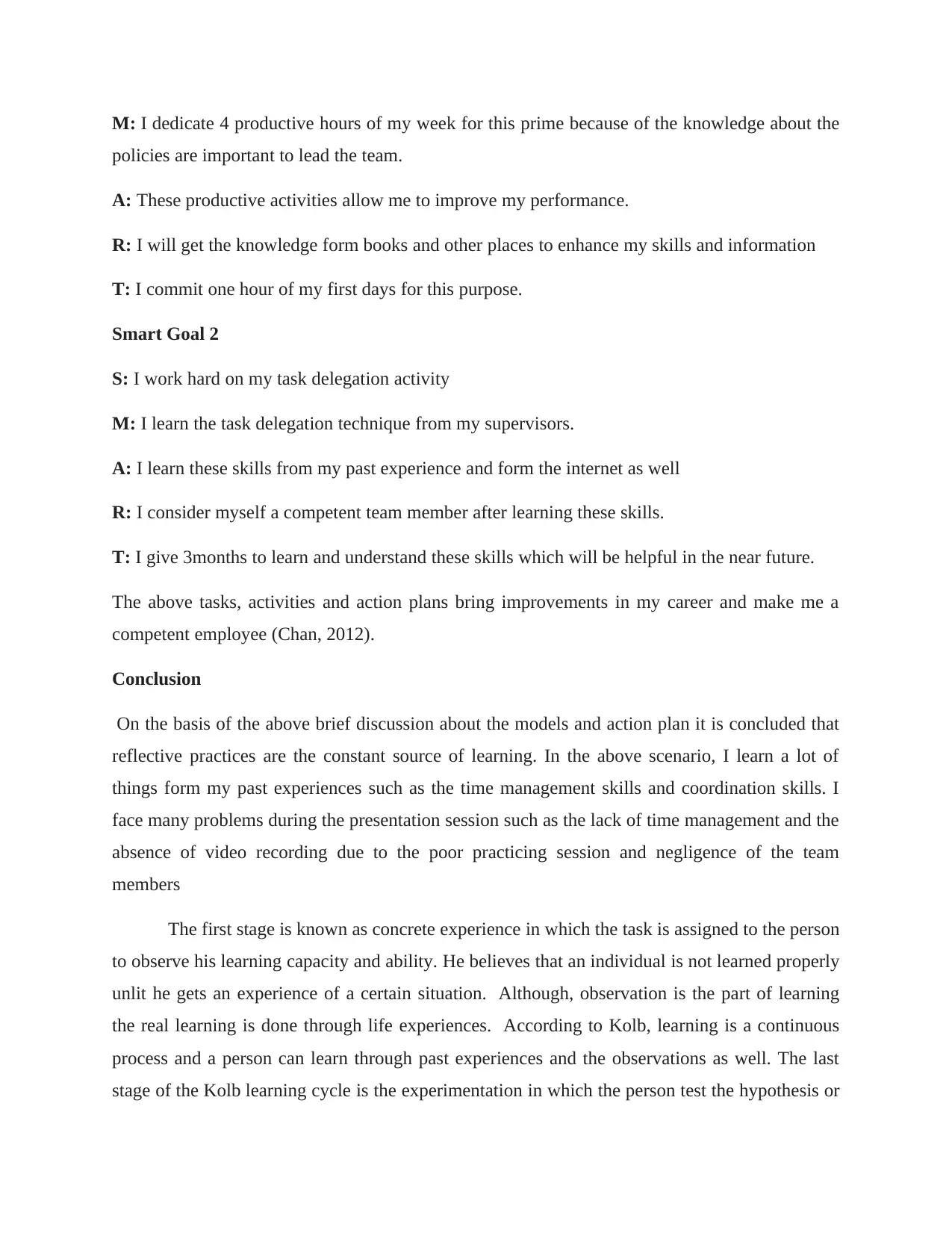
M: I dedicate 4 productive hours of my week for this prime because of the knowledge about the
policies are important to lead the team.
A: These productive activities allow me to improve my performance.
R: I will get the knowledge form books and other places to enhance my skills and information
T: I commit one hour of my first days for this purpose.
Smart Goal 2
S: I work hard on my task delegation activity
M: I learn the task delegation technique from my supervisors.
A: I learn these skills from my past experience and form the internet as well
R: I consider myself a competent team member after learning these skills.
T: I give 3months to learn and understand these skills which will be helpful in the near future.
The above tasks, activities and action plans bring improvements in my career and make me a
competent employee (Chan, 2012).
Conclusion
On the basis of the above brief discussion about the models and action plan it is concluded that
reflective practices are the constant source of learning. In the above scenario, I learn a lot of
things form my past experiences such as the time management skills and coordination skills. I
face many problems during the presentation session such as the lack of time management and the
absence of video recording due to the poor practicing session and negligence of the team
members
The first stage is known as concrete experience in which the task is assigned to the person
to observe his learning capacity and ability. He believes that an individual is not learned properly
unlit he gets an experience of a certain situation. Although, observation is the part of learning
the real learning is done through life experiences. According to Kolb, learning is a continuous
process and a person can learn through past experiences and the observations as well. The last
stage of the Kolb learning cycle is the experimentation in which the person test the hypothesis or
policies are important to lead the team.
A: These productive activities allow me to improve my performance.
R: I will get the knowledge form books and other places to enhance my skills and information
T: I commit one hour of my first days for this purpose.
Smart Goal 2
S: I work hard on my task delegation activity
M: I learn the task delegation technique from my supervisors.
A: I learn these skills from my past experience and form the internet as well
R: I consider myself a competent team member after learning these skills.
T: I give 3months to learn and understand these skills which will be helpful in the near future.
The above tasks, activities and action plans bring improvements in my career and make me a
competent employee (Chan, 2012).
Conclusion
On the basis of the above brief discussion about the models and action plan it is concluded that
reflective practices are the constant source of learning. In the above scenario, I learn a lot of
things form my past experiences such as the time management skills and coordination skills. I
face many problems during the presentation session such as the lack of time management and the
absence of video recording due to the poor practicing session and negligence of the team
members
The first stage is known as concrete experience in which the task is assigned to the person
to observe his learning capacity and ability. He believes that an individual is not learned properly
unlit he gets an experience of a certain situation. Although, observation is the part of learning
the real learning is done through life experiences. According to Kolb, learning is a continuous
process and a person can learn through past experiences and the observations as well. The last
stage of the Kolb learning cycle is the experimentation in which the person test the hypothesis or
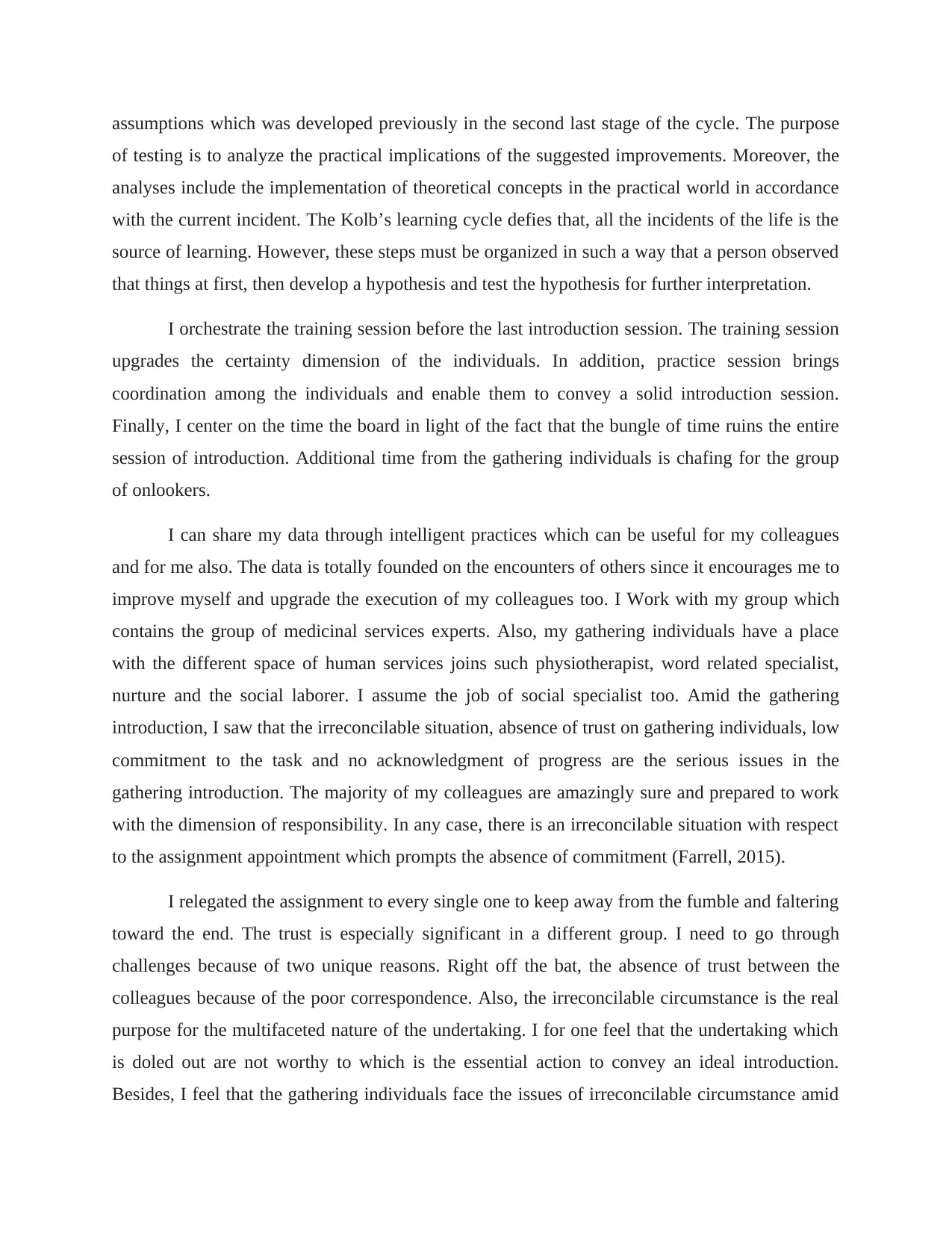
assumptions which was developed previously in the second last stage of the cycle. The purpose
of testing is to analyze the practical implications of the suggested improvements. Moreover, the
analyses include the implementation of theoretical concepts in the practical world in accordance
with the current incident. The Kolb’s learning cycle defies that, all the incidents of the life is the
source of learning. However, these steps must be organized in such a way that a person observed
that things at first, then develop a hypothesis and test the hypothesis for further interpretation.
I orchestrate the training session before the last introduction session. The training session
upgrades the certainty dimension of the individuals. In addition, practice session brings
coordination among the individuals and enable them to convey a solid introduction session.
Finally, I center on the time the board in light of the fact that the bungle of time ruins the entire
session of introduction. Additional time from the gathering individuals is chafing for the group
of onlookers.
I can share my data through intelligent practices which can be useful for my colleagues
and for me also. The data is totally founded on the encounters of others since it encourages me to
improve myself and upgrade the execution of my colleagues too. I Work with my group which
contains the group of medicinal services experts. Also, my gathering individuals have a place
with the different space of human services joins such physiotherapist, word related specialist,
nurture and the social laborer. I assume the job of social specialist too. Amid the gathering
introduction, I saw that the irreconcilable situation, absence of trust on gathering individuals, low
commitment to the task and no acknowledgment of progress are the serious issues in the
gathering introduction. The majority of my colleagues are amazingly sure and prepared to work
with the dimension of responsibility. In any case, there is an irreconcilable situation with respect
to the assignment appointment which prompts the absence of commitment (Farrell, 2015).
I relegated the assignment to every single one to keep away from the fumble and faltering
toward the end. The trust is especially significant in a different group. I need to go through
challenges because of two unique reasons. Right off the bat, the absence of trust between the
colleagues because of the poor correspondence. Also, the irreconcilable circumstance is the real
purpose for the multifaceted nature of the undertaking. I for one feel that the undertaking which
is doled out are not worthy to which is the essential action to convey an ideal introduction.
Besides, I feel that the gathering individuals face the issues of irreconcilable circumstance amid
of testing is to analyze the practical implications of the suggested improvements. Moreover, the
analyses include the implementation of theoretical concepts in the practical world in accordance
with the current incident. The Kolb’s learning cycle defies that, all the incidents of the life is the
source of learning. However, these steps must be organized in such a way that a person observed
that things at first, then develop a hypothesis and test the hypothesis for further interpretation.
I orchestrate the training session before the last introduction session. The training session
upgrades the certainty dimension of the individuals. In addition, practice session brings
coordination among the individuals and enable them to convey a solid introduction session.
Finally, I center on the time the board in light of the fact that the bungle of time ruins the entire
session of introduction. Additional time from the gathering individuals is chafing for the group
of onlookers.
I can share my data through intelligent practices which can be useful for my colleagues
and for me also. The data is totally founded on the encounters of others since it encourages me to
improve myself and upgrade the execution of my colleagues too. I Work with my group which
contains the group of medicinal services experts. Also, my gathering individuals have a place
with the different space of human services joins such physiotherapist, word related specialist,
nurture and the social laborer. I assume the job of social specialist too. Amid the gathering
introduction, I saw that the irreconcilable situation, absence of trust on gathering individuals, low
commitment to the task and no acknowledgment of progress are the serious issues in the
gathering introduction. The majority of my colleagues are amazingly sure and prepared to work
with the dimension of responsibility. In any case, there is an irreconcilable situation with respect
to the assignment appointment which prompts the absence of commitment (Farrell, 2015).
I relegated the assignment to every single one to keep away from the fumble and faltering
toward the end. The trust is especially significant in a different group. I need to go through
challenges because of two unique reasons. Right off the bat, the absence of trust between the
colleagues because of the poor correspondence. Also, the irreconcilable circumstance is the real
purpose for the multifaceted nature of the undertaking. I for one feel that the undertaking which
is doled out are not worthy to which is the essential action to convey an ideal introduction.
Besides, I feel that the gathering individuals face the issues of irreconcilable circumstance amid
⊘ This is a preview!⊘
Do you want full access?
Subscribe today to unlock all pages.

Trusted by 1+ million students worldwide
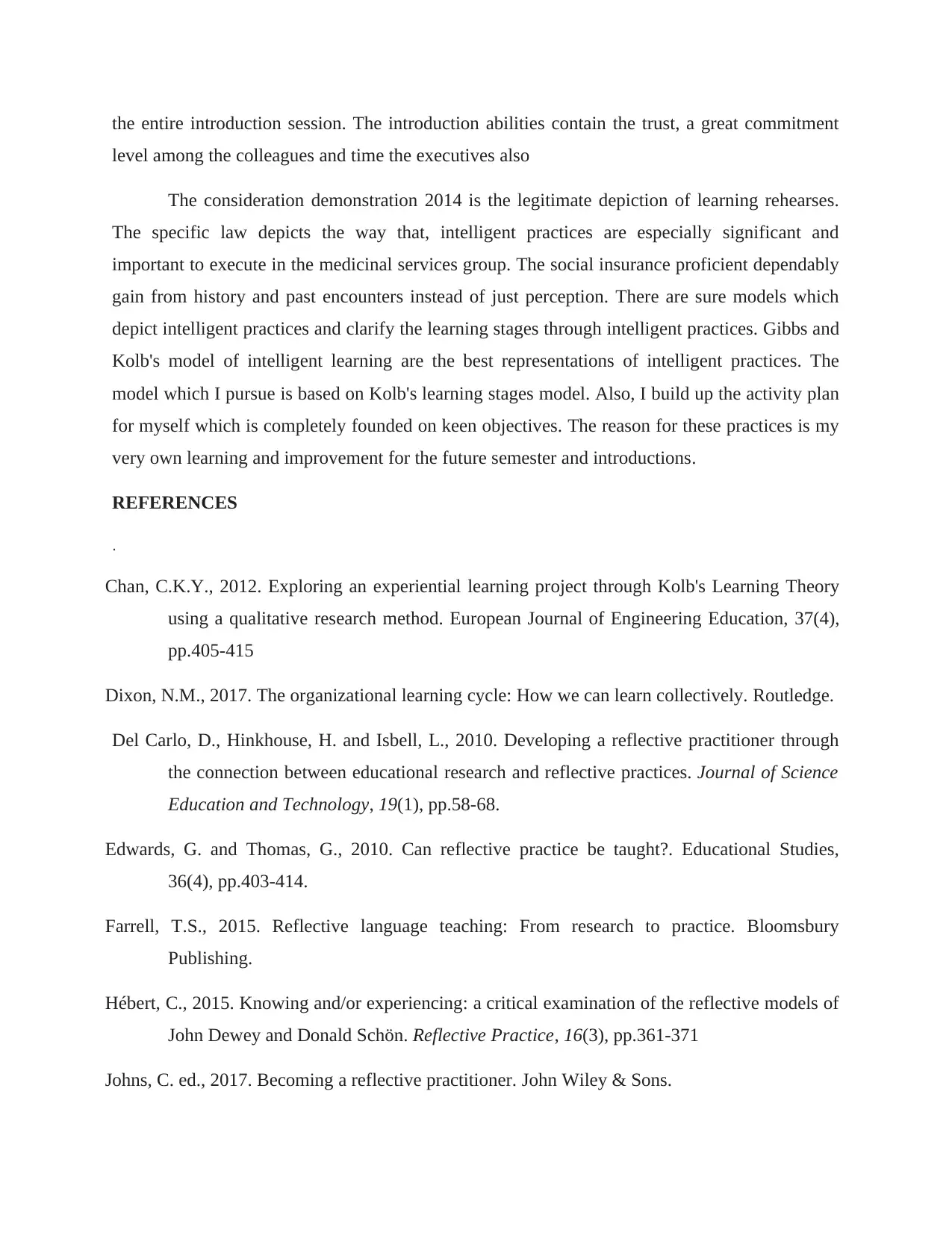
the entire introduction session. The introduction abilities contain the trust, a great commitment
level among the colleagues and time the executives also
The consideration demonstration 2014 is the legitimate depiction of learning rehearses.
The specific law depicts the way that, intelligent practices are especially significant and
important to execute in the medicinal services group. The social insurance proficient dependably
gain from history and past encounters instead of just perception. There are sure models which
depict intelligent practices and clarify the learning stages through intelligent practices. Gibbs and
Kolb's model of intelligent learning are the best representations of intelligent practices. The
model which I pursue is based on Kolb's learning stages model. Also, I build up the activity plan
for myself which is completely founded on keen objectives. The reason for these practices is my
very own learning and improvement for the future semester and introductions.
REFERENCES
.
Chan, C.K.Y., 2012. Exploring an experiential learning project through Kolb's Learning Theory
using a qualitative research method. European Journal of Engineering Education, 37(4),
pp.405-415
Dixon, N.M., 2017. The organizational learning cycle: How we can learn collectively. Routledge.
Del Carlo, D., Hinkhouse, H. and Isbell, L., 2010. Developing a reflective practitioner through
the connection between educational research and reflective practices. Journal of Science
Education and Technology, 19(1), pp.58-68.
Edwards, G. and Thomas, G., 2010. Can reflective practice be taught?. Educational Studies,
36(4), pp.403-414.
Farrell, T.S., 2015. Reflective language teaching: From research to practice. Bloomsbury
Publishing.
Hébert, C., 2015. Knowing and/or experiencing: a critical examination of the reflective models of
John Dewey and Donald Schön. Reflective Practice, 16(3), pp.361-371
Johns, C. ed., 2017. Becoming a reflective practitioner. John Wiley & Sons.
level among the colleagues and time the executives also
The consideration demonstration 2014 is the legitimate depiction of learning rehearses.
The specific law depicts the way that, intelligent practices are especially significant and
important to execute in the medicinal services group. The social insurance proficient dependably
gain from history and past encounters instead of just perception. There are sure models which
depict intelligent practices and clarify the learning stages through intelligent practices. Gibbs and
Kolb's model of intelligent learning are the best representations of intelligent practices. The
model which I pursue is based on Kolb's learning stages model. Also, I build up the activity plan
for myself which is completely founded on keen objectives. The reason for these practices is my
very own learning and improvement for the future semester and introductions.
REFERENCES
.
Chan, C.K.Y., 2012. Exploring an experiential learning project through Kolb's Learning Theory
using a qualitative research method. European Journal of Engineering Education, 37(4),
pp.405-415
Dixon, N.M., 2017. The organizational learning cycle: How we can learn collectively. Routledge.
Del Carlo, D., Hinkhouse, H. and Isbell, L., 2010. Developing a reflective practitioner through
the connection between educational research and reflective practices. Journal of Science
Education and Technology, 19(1), pp.58-68.
Edwards, G. and Thomas, G., 2010. Can reflective practice be taught?. Educational Studies,
36(4), pp.403-414.
Farrell, T.S., 2015. Reflective language teaching: From research to practice. Bloomsbury
Publishing.
Hébert, C., 2015. Knowing and/or experiencing: a critical examination of the reflective models of
John Dewey and Donald Schön. Reflective Practice, 16(3), pp.361-371
Johns, C. ed., 2017. Becoming a reflective practitioner. John Wiley & Sons.
Paraphrase This Document
Need a fresh take? Get an instant paraphrase of this document with our AI Paraphraser
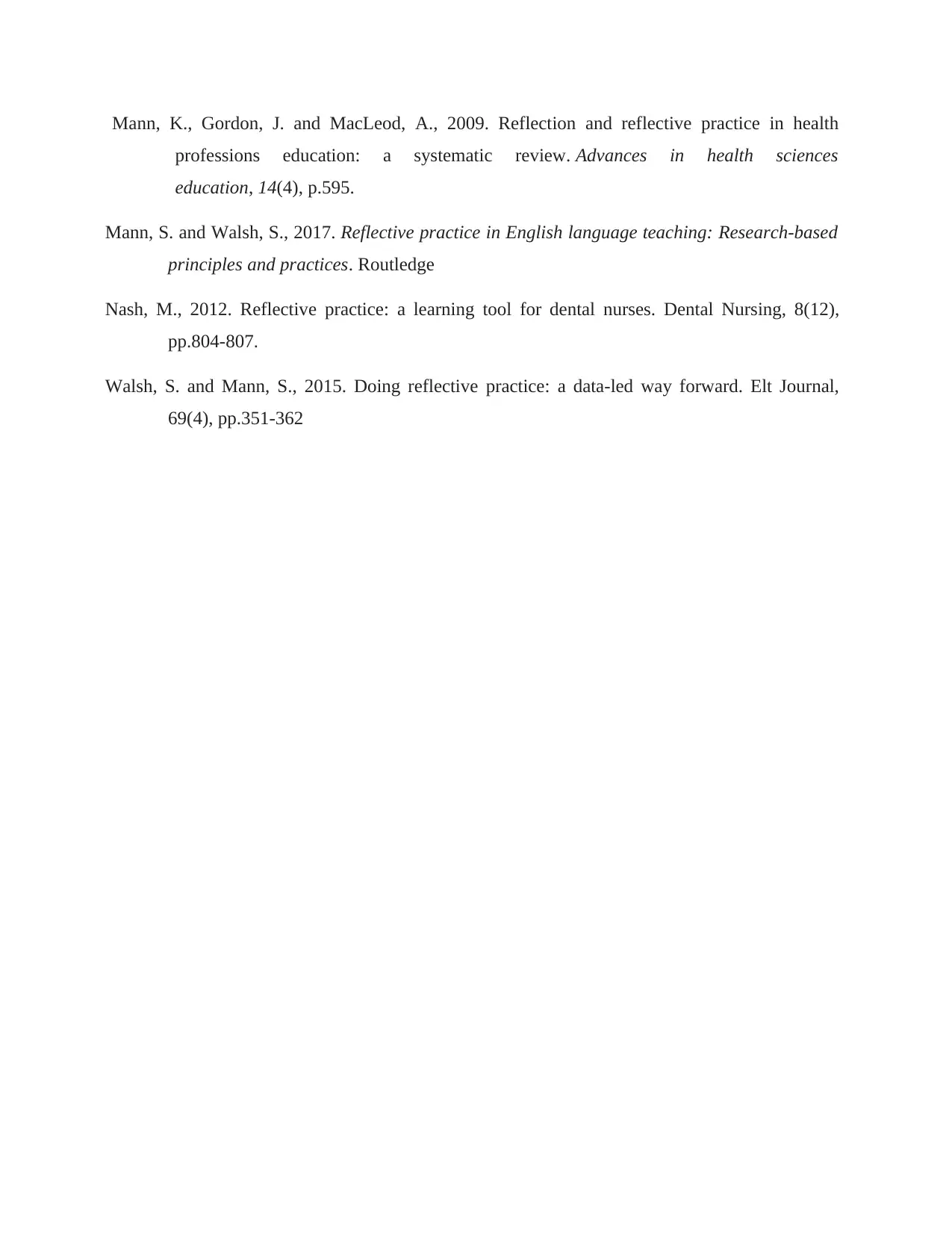
Mann, K., Gordon, J. and MacLeod, A., 2009. Reflection and reflective practice in health
professions education: a systematic review. Advances in health sciences
education, 14(4), p.595.
Mann, S. and Walsh, S., 2017. Reflective practice in English language teaching: Research-based
principles and practices. Routledge
Nash, M., 2012. Reflective practice: a learning tool for dental nurses. Dental Nursing, 8(12),
pp.804-807.
Walsh, S. and Mann, S., 2015. Doing reflective practice: a data-led way forward. Elt Journal,
69(4), pp.351-362
professions education: a systematic review. Advances in health sciences
education, 14(4), p.595.
Mann, S. and Walsh, S., 2017. Reflective practice in English language teaching: Research-based
principles and practices. Routledge
Nash, M., 2012. Reflective practice: a learning tool for dental nurses. Dental Nursing, 8(12),
pp.804-807.
Walsh, S. and Mann, S., 2015. Doing reflective practice: a data-led way forward. Elt Journal,
69(4), pp.351-362
1 out of 8
Related Documents
Your All-in-One AI-Powered Toolkit for Academic Success.
+13062052269
info@desklib.com
Available 24*7 on WhatsApp / Email
![[object Object]](/_next/static/media/star-bottom.7253800d.svg)
Unlock your academic potential
Copyright © 2020–2026 A2Z Services. All Rights Reserved. Developed and managed by ZUCOL.





